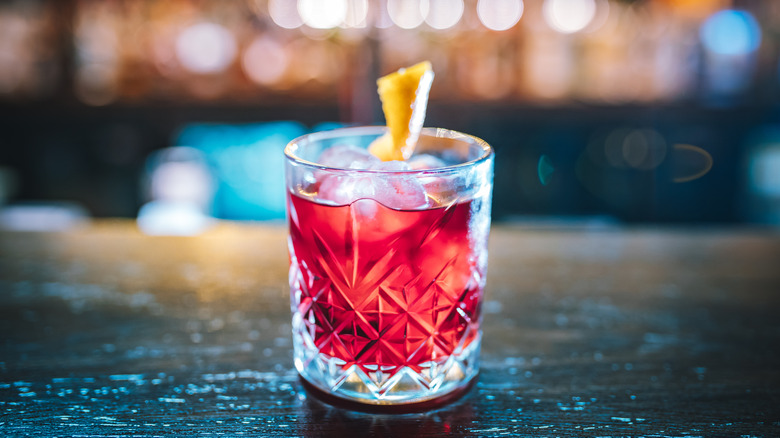What Is A 'Skinny' Cocktail (And Why We Should Stop Using The Term)
A 1977 issue of Vogue magazine advertised a diet that would make followers lose five pounds in three days and feel "full of the joie de vivre." The prescription? Each day, eat only three hard-boiled eggs, a five-ounce steak, three cups of black coffee, and an entire bottle of white wine. While this far-out diet seems ridiculous to readers now, 1977 wasn't all that long ago, and the cultural attitude of wanting to enjoy a drink while "staying skinny" is (alas) far from dead. It isn't uncommon for folks to skip dinner before a night of drinking to offset the calories in alcohol. It's such a real thing, in fact, that Dr. Harris Stratyner, vice president and New York regional director of Caron Treatment Centers, refers to the issue as "Drunkorexia," via Glamour.
It's no secret that alcohol has a lot of calories. A bottle of Guinness packs 125 calories and 10 grams of carbs, while Miller High Life totes 143 calories and 13.1 grams of carbs. But just because these figures might seem high doesn't mean it's okay to pass on a pre-drinking-night meal, as it's widely known drinking on an empty stomach can be dangerous. So people came up with a solution to this perceived problem. Enter: the phenomenon of the "skinny" cocktail.
Skinny cocktails have lower sugar and fewer calories
"Skinny" cocktails are quite simply a lower-sugar, lower-calorie version of another cocktail, like a margarita or Cosmopolitan. Often, these drinks boast 100 calories or fewer, an accolade they typically achieve by subbing Stevia for sugar, using plain soda water or tonic as a mixer, or decreasing the drink's alcohol content.
While avoiding excess sugar or calories is of course fine if that is your goal, the word "skinny" itself is problematic. Toting the adjective as some sort of cultural ideal discounts the many other, often healthier, things that bodies can be, like sturdy, athletic, or soft. It's also crucial to note here that "skinny" is a genderless adjective; while American society notably places oversized importance on the thinness of women and femme-identifying individuals, the gilded, largely unreachable destination of "skinny" isn't something from which men and non-binary folks are immune.
Dieting can improve overall health and quality of life when done smartly and on the advice of a doctor. But, Scientific American reports, in excess, intentionally depriving oneself of certain foods can actually rewrite the neurological synapses in the brain connected to the reward center. For this reason, according to the Mayo Clinic, dieting puts people at a higher risk of developing a serious eating disorder. This concept takes on an entirely new form in the realm of alcohol, where terms like "beer gut" are colloquially commonplace and a caloric-deprivation mindset is in-vogue.
An overdue change in the lexicon
To help illustrate this point is Skinnygirl Cocktails, a line of ready-to-drink, lower-calorie versions of classic drinks made by using sugar substitutes and lower ABV spirits. The blatantly gendered advertising used by the brand willingly perpetuates the harmful and intrinsically patriarchal cultural pressure for femme individuals to occupy less and less space. None of this is a dig on the brand's White Cranberry Cosmo Cocktail (which rocks), but by 86ing the word "skinny" from a cocktail name altogether, we work to eliminate the fixation on calories and let all foodies enjoy themselves (responsibly) — which is what a night spent sipping cocktails should ultimately be about anyway.
If you need help with an eating disorder or know someone who does, help is available. Visit the National Eating Disorders Association website or contact NEDA's Live Helpline at 1-800-931-2237. You can also receive 24/7 Crisis Support via text (send NEDA to 741-741).


